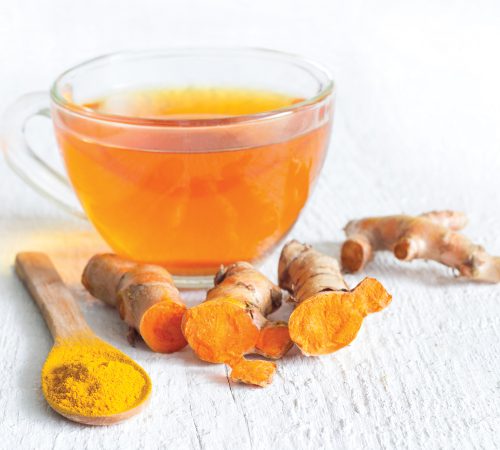
Do the health benefits of turmeric match the hype? Dietitian Katrina Pace investigates.
Before becoming the latest health fix-all, turmeric was mainly known as the bright orange dried spice used in making curry. Over time, it’s become easier to buy fresh turmeric – a small root that looks similar to fresh ginger.
Fresh, turmeric has a slightly spicy, earthy taste. Now we can find turmeric lattes, turmeric tea and turmeric supplements all over the place.
What’s the deal with turmeric?
The active ingredient of turmeric is curcumin. Curcumin is promoted as being anti-inflammatory, a powerful antioxidant and a protector of the nervous system that may play a role in preventing or treating inflammation-related conditions such as cancer, Alzheimer’s, arthritis, inflammatory bowel disease (IBD) and depression.
What does the research say?
Depression
Results of a meta-analysis of six studies that investigated the role of curcumin in people with depression was published in 2017. Results varied but, overall, it was found using a curcumin supplement did reduce symptoms of depression and, in three of the studies, also reduced anxiety. Doses of curcumin in the studies ranged from 250mg-500mg twice daily and changes took about four to eight weeks to show. It’s worth noting the number of studies is small, but indications are that a curcumin or turmeric supplement might have a role in helping to manage anxiety and depression.
Arthritis
Again, only a small number of studies were included in a metaanalysis of curcumin and arthritis. But results showed 1000mg of curcumin supplement daily reduced the pain and symptoms associated with arthritis. And this improvement in symptoms matched the improvement seen in studies on pain medications in arthritis.
Heart disease
Studies on the use of curcumin and heart disease suggest a curcumin supplement may help reduce blood lipid levels (LDL cholesterol and triglycerides), which are risk factors for heart disease. Doses of 600mg to 2g daily were investigated. The conclusion was that curcumin may be useful to take alongside prescribed medications.
Inflammatory bowel disease
Because it is an antiinflammatory, curcumin has been used in studies looking for new treatments for the IBDs, ulcerative colitis and Crohn’s disease. Studies have found 2g of curcumin daily for six months, alongside medical treatments for ulcerative colitis, may increase remission periods.
Side effects
Up to 12g daily of curcumin has been found to be tolerated without side effects. Some studies noted nausea and diarrhoea as possible side effects.
Can’t I just eat fresh turmeric?
The active part of turmeric is called curcumin. However, to get enough curcumin from fresh or dried turmeric would be very hard, as the most pure turmeric powder only contains around 3 per cent curcumin. So turmeric or curcumin supplements are the only way to get the high doses used in the research.
What to look for in a supplement
- Curcumin is not very well absorbed into the body. Another spice, black pepper, which contains piperine, can help the body absorb curcumin.
- Check the label for the amount of curcumin, not turmeric. Note: 1g is the same as 1000mg.
- Watch out for any other herbal additives to the supplement, as they may interact with other medications.
While usually sold as turmeric,the amount of curcumin provided will be listed on supplements. Discuss using turmeric/curcumin with your GP before you start taking this supplement because you need to make sure, as an antiinflammatory, it doesn’t interact with any medications you may already be taking.
Article sources and references
- Andrade C. 2014. A critical examination of studies on curcumin for depression. The Journal of Clinical Psychiatry 75:1110-2
- Daily JW et al. 2016. Efficacy of turmeric extracts and curcumin for alleviating the symptoms of joint arthritis: A systematic review and meta-analysis of randomized clinical trials. Journal of Medicinal Food 19:717-29
- Garg SK et al. 2012. Curcumin for maintenance of remission in ulcerative colitis. The Cochrane Database of Systematic Reviews 10:CD008424
- Iqbal U et al. 2018. Use of curcumin in achieving clinical and endoscopic remission in ulcerative colitis: A systematic review and meta-analysis. The American Journal of the Medical Sciences 356:350-6
- Kocaadam B & Şanlier N. 2017. Curcumin, an active component of turmeric (Curcuma longa), and its effects on health. Critical Reviews in Food Science and Nutrition 57:2889-95
- Lopresti AL et al. 2014. Curcumin for the treatment of major depression: A randomised, double-blind, placebo controlled study. Journal of Affective Disorders 67:368-75
- Ng QX et al. 2017. Clinical use of curcumin in depression: A meta-analysis. Journal of the American Medical Directors Association 18:503-8
- Qin S et al. 2017. Efficacy and safety of turmeric and curcumin in lowering blood lipid levels in patients with cardiovascular risk factors: A meta-analysis of randomized controlled trials. Nutrition Journal 16:68
- Shoba G et al. 1998. Influence of piperine on the pharmacokinetics of curcumin in animals and human volunteers. Planta Medica 64:353-56
- Tayyem RF et al. 2006. Curcumin content of turmeric and curry powders. Nutrition and Cancer 55:126-31
www.healthyfood.com











